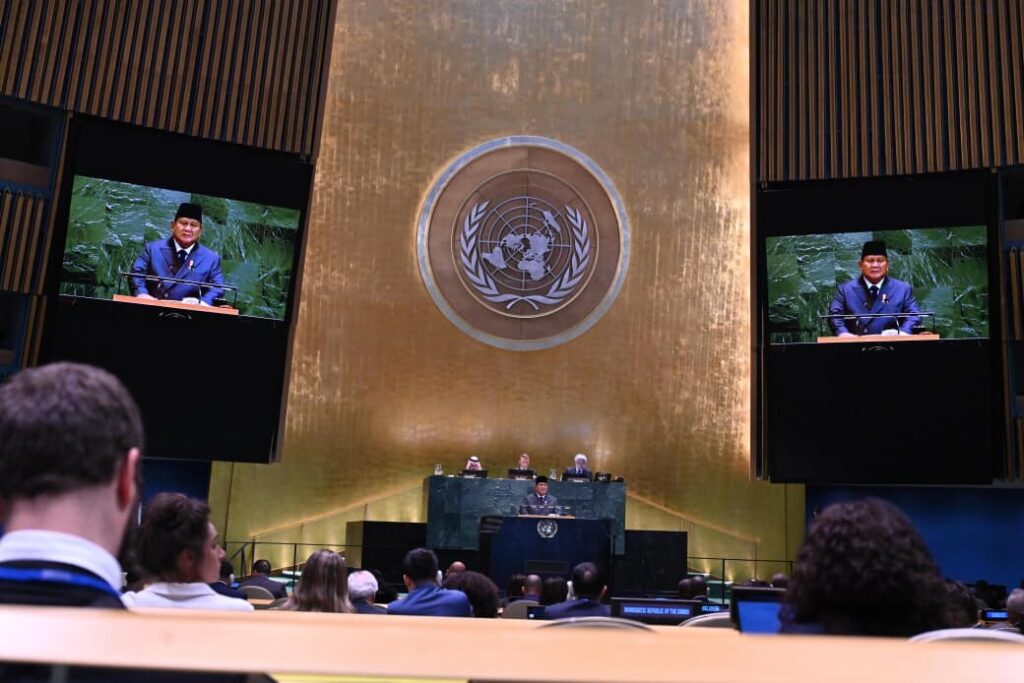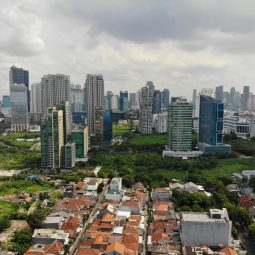This article is the direct opinion of Rezki Sri Wibowo as our Managing Director and was previously published on Detik.com and we are republishing it on the Arghajata website to expand our readership. This article has been carefully reviewed to provide accurateness and reliable information, ensuring high standards of quality, credibility, and trustworthiness.
The UN General Assembly has just ratified the New York Declaration, which promotes a two-state solution expected to bring an end to the Israel–Palestine conflict. The widespread adoption of this declaration in the General Assembly is not merely a diplomatic victory for Palestine.
This document is not simply a declaration, but also offers a roadmap and an attempt to instill international legitimacy in a region long shaken by strife.
For Indonesia, the significance of this move extends far beyond moral solidarity with the Palestinian people. A more legitimate and predictable Middle Eastern regional architecture could dampen the turbulence that has long spilled over into energy prices, strategic shipping lanes, and global trade flows. Disruptions in these areas directly impact Indonesia’s economic resilience.
Without a legitimate and collectively accepted order, the threat of conflict and disputes will continue to be a recurring disruption to Middle Eastern geopolitical stability. Historically, conflict in this region has always influenced energy markets and global shipping routes. In 1973, for instance, OAPEC imposed an oil embargo in response to countries supporting Israel during the Yom Kippur War.
That embargo doubled and then quadrupled oil prices, embedding inflation and pushing the world into recession. The same pattern resurfaced with the recent turmoil in the Red Sea, which cut in half the trade volume passing through the Suez Canal in early 2024.
Global shipping companies have since chosen longer routes, diverting around South Africa, considered a safer option though at the expense of higher costs and longer transit times.
The UN has assessed that these alternative routes increase freight rates, raise insurance premiums, and weaken global shipping connectivity.
For Indonesia, which depends on both energy imports and international sea lanes, every spike in oil prices and shipping costs translates into ballooning domestic energy subsidies, inflationary pressure, and a weakening fiscal position. Without international legitimacy in the Middle East capable of stabilizing the regional balance, such volatility will keep recurring.
The New York Declaration establishes a framework that combines two key elements of regional stability, creating an opportunity to reduce volatility in the Middle East.
First, it introduces a security framework through a UN-backed stabilization mission to oversee the transfer of power from Hamas to the Palestinian Authority. The declaration also calls on Hamas to surrender its weapons and relinquish control of Gaza. The legitimacy rooted in broad international consensus was evident in the UN vote, with 142 countries in favor.
For the first time, the Arab League openly condemned the Hamas attack of October 7, 2023, and urged the group to be disarmed.
This combination of security structures and collective acceptance provides a foundation for a regionally legitimized framework capable of withstanding ongoing instability.
For Indonesia, the meaning of this declaration is both real and immediate. Legitimacy underpinning the Middle Eastern order is not just a matter of diplomacy, but the first safeguard against external shocks that weigh heavily on the domestic economy.
Indonesia’s reliance on crude oil, LPG, and refined fuel imports makes the state budget highly sensitive to fluctuations in energy prices. In 2022, for example, the surge in global oil prices drove energy subsidies to exceed IDR 500 trillion, nearly double the amount from the previous year.
Disruptions in shipping lanes are also felt directly. More than 40 percent of Indonesia’s exports to Europe pass through the Suez Canal, meaning that every crisis in the Red Sea drives up logistics costs and slows the flow of goods. The rupiah becomes vulnerable, as shocks in energy and trade markets increase pressure on foreign reserves and narrow the space for monetary policy.
From this perspective, Indonesia’s support for the New York Declaration arises not only from moral solidarity, but also from strategic calculation. A more legitimate order in the Middle East is a prerequisite for Indonesia’s economic resilience. Such legitimacy not only reduces the triggers of volatility, but also opens pathways for new economic opportunities with Middle Eastern nations.
Regional stability bolsters investor confidence, for instance, long-term capital from wealthy Gulf states for infrastructure and energy development in Indonesia.
Furthermore, Middle Eastern markets provide steadily growing demand for halal products, agricultural commodities, and renewable energy from Indonesia. Safe shipping lanes ensure that these opportunities can be realized without soaring logistics costs.
With regional legitimacy as a foundation, the Middle East can function not as a perpetual source of volatility, but as a partner that strengthens Indonesia’s development agenda.
In his speech at the UN Two-State Solution Summit on September 22, 2025, President Prabowo Subianto reaffirmed Indonesia’s commitment to supporting Palestinian independence and the two-state solution. He emphasized that the New York Declaration represents the best path toward peace and justice.
From this standpoint, the New York Declaration is not merely a diplomatic document, but an effort to embed legitimacy in a region plagued for decades by endless conflict. By anchoring power within a framework broadly accepted by the international community, the declaration has the potential to suppress cycles of turmoil that frequently shake energy markets and global shipping routes.
For Indonesia, supporting this declaration is a strategy to keep energy prices under control, guarantee trade flows, and maintain fiscal stability.
Peace for Palestine not only offers a renewed future for its people but also establishes an international order that enables Indonesia to grow with confidence.


















